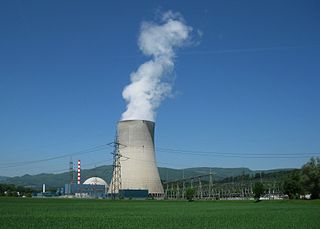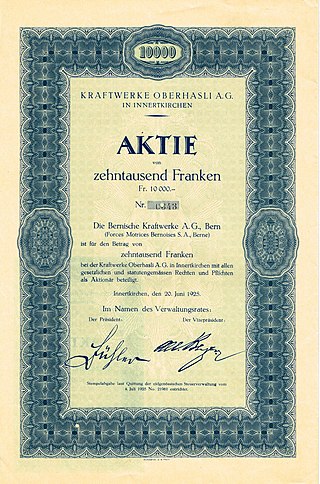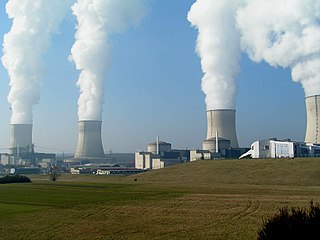
The Grande Dixence Dam is a concrete gravity dam on the Dixence at the head of the Val d'Hérémence in the canton of Valais in Switzerland. At 285 m (935 ft) high, it is the tallest gravity dam in the world, seventh tallest dam overall, and the tallest dam in Europe. It is part of the Cleuson-Dixence Complex. With the primary purpose of hydroelectric power generation, the dam fuels four power stations, totaling the installed capacity to 2,069 MW, generating approximately 2,000 GWh annually, enough to power 400,000 Swiss households.
EnBW Energie Baden-Württemberg AG, or simply EnBW, is a publicly-traded energy company headquartered in Karlsruhe, Germany.

Grande Dixence S.A. is a Société Anonyme operating in Switzerland which runs the Bieudron Hydro Project and the Grande Dixence Dam in the Val d'Hérens, Valais. Grande Dixence is primarily concerned with the production of hydroelectricity by harnessing the hydropower associated with the steep changes of elevation found in the part of the Alps.
Nuclear power in Switzerland is generated by three nuclear power plants, with a total of four operational reactors (see list below). Since 1985, nuclear power has been contributing approximately 40% of Switzerland's electrical energy. In 2022, it produced 23 terawatt-hours (TWh) of electricity, and accounted for 37% of the nation's gross electricity generation of 62 TWh, while 55% was produced by hydroelectric plants and 8% came from conventional thermal power stations and non-hydro renewable energy sources.

The Beznau nuclear power plant is a nuclear power plant of the Swiss energy utility Axpo, located in the municipality Döttingen, Canton of Aargau, Switzerland, on an artificial island in the Aare river. The plant has been operating since September 1969.

The Gösgen Nuclear Power Plant is located in the Däniken municipality on a loop of the Aar river. It is operated by the ad hoc society Kernkraftwerk Gösgen-Däniken AG.

The Leibstadt Nuclear Power Plant is located near Leibstadt, canton of Aargau, Switzerland, on the Rhine and close to the border with Germany. Commissioned in 1984, it is the youngest and most powerful of the country's four operating reactors.

The Mühleberg Nuclear Power Plant is a formerly operational nuclear power plant in the Mühleberg municipality in the canton of Bern, Switzerland. Operated by BKW FMB Energie AG, the plant generated power from 6 November 1972 until 20 December 2019. Nuclear decommissioning of the plant began in January 2020 and is currently forecasted to be completed by 2034.
Romania is the 38th largest energy consumer in the world and the largest in South Eastern Europe as well as an important producer of natural gas, oil and coal in Europe.
Resun AG was a company located in Aarau, Switzerland. Its purpose was to manage the construction of two new nuclear reactors. These are unofficially known as Beznau 3 and Mühleberg 2 from the locations where they should be built. In August 2017 the company was liquidated.

Kraftwerke Oberhasli AG (KWO) is a Swiss energy supply company, based in Innertkirchen (BE) and operating several hydroelectric plants in the Oberhasli area of the canton of Bern. It also operates a number of tourist attractions in the same area, mostly with some relationship to its energy supply business. It uses the brands Grimselstrom and Grimselwelt, the latter specifically for its tourism ventures. Both brands are named after the Grimsel Pass that forms the upper end of its operating area.

The Swiss Federal Nuclear Safety Inspectorate is Switzerland's regulatory supervisory authority for nuclear safety and for the security of nuclear installations; it supervises the nuclear power plants at Beznau, Gösgen, Leibstadt and Mühleberg, the research reactors at the Paul Scherrer Institute, the University of Basel and the Swiss Federal Institute of Technology, as well as the Swiss national central interim storage facility for radioactive waste (ZWILAG). ENSI's headquarters are located in Brugg in the Canton of Aargau.

Primeo Energie or EBM(Cooperative Elektra Birseck, Münchenstein) is a Swiss energy supplier with head office in Münchenstein. It was founded as a cooperative under private law in 1897. EBM supplies around 230,000 people with electricity in North-West Switzerland and Alsace. The company operates 167 local heat supply systems in Switzerland, Alsace and South Germany.

Energy in Switzerland is transitioning towards sustainability, targeting net zero emissions by 2050 and a 50% reduction in greenhouse gas emissions by 2030.

Alpiq is an internationally active energy group headquartered in Lausanne, Switzerland. The company was established in 2009 after the merger of Atel Holding AG and EOS S.A..

The electricity sector in France is dominated by its nuclear power, which accounted for 71.7% of total production in 2018, while renewables and fossil fuels accounted for 21.3% and 7.1%, respectively. France has the largest share of nuclear electricity in the world, and together with renewable energy supplies, this has helped its grid achieve very low carbon intensity.

The electricity sector in Switzerland relies mainly on hydroelectricity, since the Alps cover almost two-thirds of the country's land mass, providing many large mountain lakes and artificial reservoirs suited for hydro power. In addition, the water masses drained from the Swiss Alps are intensively used by run-of-the-river hydroelectricity (ROR). With 9,052 kWh per person in 2008, the country's electricity consumption is relatively high and was 22% above the European Union's average.
Repower is an international energy utility with its operational headquarters in Poschiavo. The company's history goes back more than 100 years, with the foundation in 1904 of Kraftwerke Brusio AG. Its key markets include Switzerland and Italy. The group operates along the entire value chain, from generation and trading to sales.

The Linth–Limmern Power Stations are a system of hydroelectric power stations located south of Linthal in the canton of Glarus, Switzerland. The system uses five reservoirs and four power stations at steep variations in altitude.

Axpo Holding AG, headquartered in Baden in the canton of Aargau, and its subsidiaries constitute the energy company Axpo. Axpo Holding AG was established in 2001, is 100-percent publicly owned and originates from the former Nordostschweizerischen Kraftwerke AG, NOK.
















